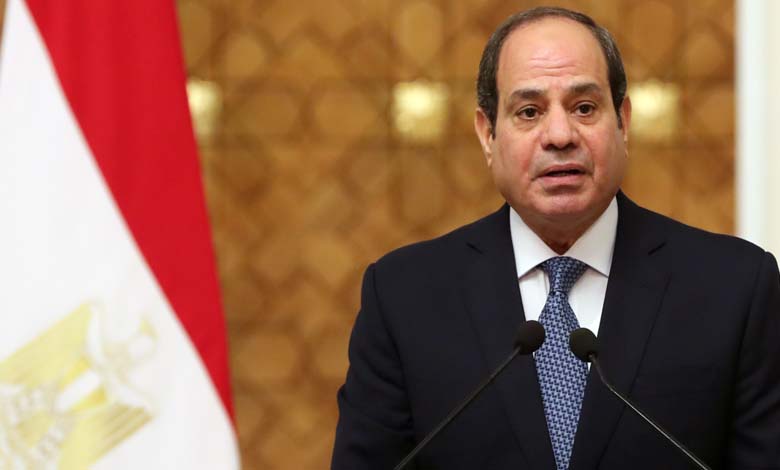El-Sisi criticizes the bidding on Egypt in refusing the displacement of Palestinians
The Egyptian President emphasizes that his country has not closed the Rafah crossing since the crisis began, pointing to Israeli airstrikes on the crossing four times

Egyptian President Abdel Fattah el-Sisi reiterated on Thursday evening that his country “will not accept the forced displacement of the inhabitants of the Gaza Strip,” emphasizing the implementation of the temporary humanitarian ceasefire beginning Friday “without delay or procrastination.”
This statement was made during a speech by the Egyptian president in a mass event titled “Long live Egypt… A people’s response in solidarity with Palestine” at Cairo International Stadium, as reported by the official news agency of the country.
El-Sisi clarified that “Egypt has 9 million guests, so there cannot be a bidding on Egypt and its position not to accept the forced displacement of Palestinians,” emphasizing that “there will be no displacement of Palestinians in the Gaza Strip to Egypt,” considering it a “red line.” This is not the first time that the Egyptian side has confirmed its rejection of displacement, considering it a threat to Egyptian national security, following Israeli officials’ discussions about the displacement of Gaza’s residents to the Sinai Peninsula.
El-Sisi confirmed that his country has not closed the Rafah crossing since the crisis began, pointing to Israeli threats to target and bombard it, noting that the Israeli aircraft targeted it four times.
He explained that the aid that Egypt has brought into the Gaza Strip amounted to about 12,000 tons, transported by 1300 trucks, stating that 158 flights arrived at Al-Arish International Airport, designated to receive aid planes from abroad.
He added that “joint Egyptian efforts with the United States and Qatari brothers have resulted in reaching a four-day extendable humanitarian ceasefire agreement,” expressing his hope that it will “begin to be implemented in the coming days without delay or procrastination,” saying, “Inshallah, we will start this from Friday morning.”
On Friday, the Egyptian president said that “reviving the two-state solution is an exhausted idea,” calling for “recognizing the Palestinian state” when receiving the Prime Ministers of Spain and Belgium in Cairo, stating, “Reviving the two-state solution is an exhausted idea and may not be what is required.”
He added, “It must move differently, which is recognizing the Palestinian state and introducing it to the United Nations… This gives seriousness,” emphasizing that his country deals calmly and wisely to maintain stability, directing his words to the Israelis, saying, “Do not think that Egypt’s position on the developments in the Gaza Strip is weak.”
On October 13th last year, the Egyptian Foreign Ministry rejected the Israeli army’s call for Gaza residents to head from the north to the areas south adjacent to the Egyptian border, followed on November 14th by a similar rejection by Cairo to the statement of Israeli Finance Minister Bezalel Smotrich on the absorption of Palestinians from Gaza in countries around the world.
Starting from Friday morning, a four-day humanitarian ceasefire begins in the Gaza Strip under an agreement between Israel and Hamas with Qatari, Egyptian, and American mediation.
The agreement includes the release of 50 Israeli prisoners from Gaza in exchange for the release of 150 Palestinians from Israeli prisons, and the entry of hundreds of trucks loaded with humanitarian, relief, medical, and fuel aid into all areas of the sector.
Regarding President el-Sisi‘s “rejection of the displacement of Palestinians,” King Abdullah II of Jordan said it embodies a “common” position with Jordan. Following the speech of the Egyptian president, King Abdullah said on Thursday, “We stand by sister Egypt in one trench,” adding in a post on his official account on the “X” platform, “The position expressed today by my brother President el-Sisi, affirming his country’s rejection of the forced displacement of Palestinian brothers from their land and considering it a red line, embodies our common position and will be immortalized in the record of Egypt’s Arab stances.”
Since October 7th last year, the Israeli army has been waging a destructive war on Gaza, leaving 14,854 Palestinian casualties, including 6,150 children and over 4,000 women, in addition to more than 36,000 injuries, with over 75% of them being children and women, according to the Gaza government’s media office.












